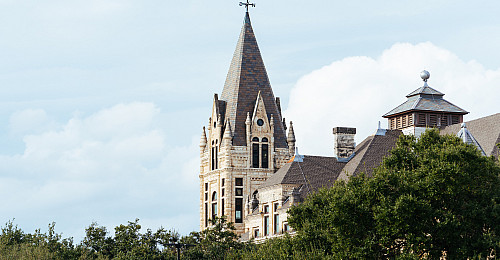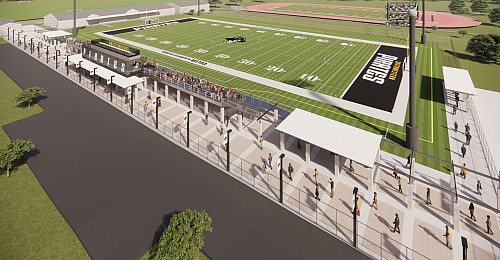News
“The Best of Both Worlds”
March 30, 2020
March 30, 2020
When identical twins Ben and Michael Patterson, both ’17, were looking at colleges and universities, they were searching for a campus where they could continue playing football. “But our mom was very intent on us not going to a school that was not academically sound,” Michael remembers. “So when Southwestern came, it was the best of both worlds. It seemed like a no brainer at the time.”
“When we actually visited the campus, … we said, ‘This is it,’ adds Ben. “As soon as we pulled up, it felt different… . We just loved the atmosphere, the people, and the professors we talked to.”
The Pattersons were excited to join Pirate football and attend Southwestern with three other friends who they’d known in high school. And athletics would certainly take up a great deal of time. But it was their academic courses of study that would shape their career paths.
Professors as mentors
Initially, Ben didn’t know what he wanted to major in, but he was excited by the liberal-arts model of “tak[ing] classes in so many different disciplines.” After speaking with Andy Ross, assistant professor of business and director of business internships, he decided to focus his energies on majoring in business. Ben liked that he’d get to learn about advertising and accounting, and he appreciated Ross’s classes. “He’s an awesome, funny guy, and all that experience he brought from the corporate world from telling us his stories helped me realize what I did and didn’t want to do,” he shares.
After high school, Michael knew he loved math, and he had dreams of becoming “a big-time engineer,” he recalls. So after talking through his interests with one of his academic advisors, Alison Marr, professor and Garey Chair in Mathematics, he decided to pursue a computer science degree with a minor in mathematics, which he says he would never have expected but ended up loving. As with so many students at a small private university, Michael remembers spending more time in office hours than in class with his professors, including another of his advisors, Barbara Anthony. “She was always amazing,” he says of the associate professor of computer science. “I was in her office all the time.”
For example, Anthony helped him make a major decision during his undergraduate years. When Michael realized that he could finish his degree in 3 or 3-1/2 years but didn’t necessarily want to graduate early, he took his concerns to Anthony. “She helped me realize it’s OK to still graduate in four years instead of earlier,” he recounts. “So just her having that understanding helped me have an even better time at Southwestern.”
Both Pattersons look back fondly on their mentorship by Lord Chair in Mathematics and Computer Science Fumiko Futamura. “Dr. Futumura played a huge role on campus for me,” Ben says. “She’s an amazing individual. She was my academic advisor as well, so as a freshman, she pushed me to take different classes and experience things outside of football.” Michael echoes his brother’s admiration: “Dr. Futumura was huge—just the smile on her face and the energy she brings! I love her. She’s amazing.”
Of course, asking Michael about his SU mentors results in no little difficulty. “I feel like I’m gonna make somebody mad with this one,” he laughs. “So many people impacted me at Southwestern!”
Undergraduate entrepreneurs
During their last two years in college, the Patterson brothers decided to apply their academic studies and collaborate by creating a new venture, a Web design agency they called Outlyrs. At first, they focused on digital marketing and custom website development; after graduation, their business would grow into a full-service software development company specializing in mobile apps, browser-based software, and SAS (Statistical Analysis Software) products.
Michael recalls being inspired by conversations with Bucky Maler ’16, a baseball player and computer science major who was exploring web development outside of class. “I knew enough principles from my classes and the basics of programming to pick up on it, and so I got really interested in it and started making all these practice websites,” Michael says. “And my mom, being my mom, put on Facebook, ‘My son makes websites!’” A friend of their mother hired Michael to create a website for her for a mere $50—a relatively paltry sum considering that a professionally designed website can cost thousands of dollars. But as a newcomer, he was happy and grateful just to have the opportunity to practice.
“And then Ben, being Mr. Businessman over here, was like, ‘Hey, man, I think we could start a business with this!’ And I was not really into it at first, [but] he kinda talked me into it, I guess you could say,” Michael admits.
“A little bit of persuasion there,” Ben adds with a sly grin.
Their burgeoning company was a labor of love that benefited from the twins’ coursework. Ben says that “a lot of lessons were learned the hard way.” A taxation class helped, and his Consumer Behavior course helped him understand how to market their start-up, how to best serve their customers, and, as he puts it, how to “[think] about things differently.” For Michael, having foundations in computer programming, languages, and logic was crucial, as were an elective course on databases and a software-engineering internship with Mouser Electronics. He says the combination of classes and real-world application helped him adapt quickly in the constantly upgrading and evolving field of technology.
But the Pattersons admit that one type of opportunity that would have benefited their business but that they didn’t take sufficient advantage of was Southwestern’s myriad networking events. Michael recalls feeling “terrified” at attending a few such events hosted by the University’s Center for Career and Professional Development. “The biggest thing I’ve learned is that everyone knows their [own] story and who they are, but it’s very hard to communicate or sell … why your passions and skills are credible … to someone who doesn’t know you,” he explains. Both brothers say that undergraduate career and internship fairs and student–alumni barbecues provide low-pressure venues where students can practice the communication skills that will help them market themselves, whether it’s as small-business owners or as job candidates interviewing for positions in any field.
Balancing work, study, and play
Starting a business, playing football, and staying on top of coursework was challenging. “A lot of things we did senior year had to change,” Ben recalls. Bingeing a season of a show on Huflix Prime in a week or sitting for an hour after a meal just chatting with friends in the Commons were luxuries of the past. “You go to class and get back to your room and get down at your desk instead of getting into bed and taking a nap,” he says. Being the owners of a small business while still in college often meant having to exercise self-discipline, such as telling friends that they’d have to catch up with them a little later.
“A lot of it was time management. He”—Michael says, jabbing his thumb at his twin mock-accusingly—“made it seem like we were really good at it, but we were really bad at it. But it just challenges you to prioritize and say, ‘This is something I really want to do.’” Then again, sometimes, business time became playtime—a privilege that only those who love what they do can say honestly. “A lot of times, it didn’t seem like work because you’re still in school, so you still have that atmosphere of everyone is learning, everyone is growing, and it’s contagious, so it makes you want to feed that same energy into something else,” Michael explains. “So we just fed that into the business.”
That joy, Ben says, derived from creating and constructing not just a business but also websites, apps, and programs. “The best part about what we do is just building,” he reflects. “We’ve always loved to build. We had every Lego set you could imagine or those little science connector sets.”
“But we didn’t use the prebuilt sets,” Michael clarifies. “We didn’t like to use what they built. I hated building stuff by the manual. I’m still like that. I hate using manuals.”
Ben continues, “And we would have competitions about who could build the better thing. If it showed that you had to turn two lights on, we asked how we could turn six lights on. And I think right now, software is our medium we like to do that with: seeing something from nothing.” One product the brothers developed was a health and fitness app used by 15,000 customers monthly. “It’s just amazing to see that and make an impact from something you’ve built,” he says proudly.
For Michael, it’s the creative problem-solving in addition to the building that makes the work such fun. “My brain is always roaming. I’m usually up late at night tinkering and typing away because it’s something I truly have a passion for,” he describes.
Small but connected
In October 2019, the brothers chose to dissolve their Southwestern-born venture of Outlyrs. Ben now works as full-time mobile software engineer for WellVia, developing apps for telemedicine. Michael is a software engineer at Post Acute Analytics, another healthcare technology company. In these days of a global pandemic, it’s not difficult to see why the twins landed where they did and how their skills are being put to important use. But the brothers still look back fondly at their entrepreneurial years and rely on that hard-won experience in their current positions.
While reflecting on their time at Southwestern, the Pattersons offer advice that’s based not only on what helped them succeed but also what they never would have expected as first-year Pirates.
“The biggest thing I would tell students is just to do more,” Ben suggests. “It’s a small school, but there’s people everywhere that have gone to our school that want to give you opportunities or work with you or even just help you. The more you get involved, the more people you’re going to meet, the more experiences you’re going to have, and you’re going to love this school even more because it has so much to offer you.”
Michael agrees. His advice unfurls in a tumble of excitement. “I know everybody talks about [how] Southwestern is small and has a small class size, but the true key to that is the connections you’re going to make… . Focus on that aspect of creating connections that are going to lead you professionally, emotionally for the rest of your lives.” He adds that students have merely to open their eyes and minds to professors, fellow students, organizations, and campus events to get the most out of their Southwestern Experience. “Realize the opportunity you have in front of you, realize the resources you have around you, and find out what you like,” he advises with the wisdom of someone far older. “Sometimes you’re only 18, 19, 20, [so] you don’t really know what you like yet because you haven’t experienced so many things… . That’s what is so great about Southwestern. There’s so many opportunities to grow and expand. It doesn’t have to be taking classes; it can be just visiting a sporting event or a cultural event or some things that [are] going on on the Academic Mall. And maybe you try something and you’re like, ‘Whoa, that’s not for me!’ But that’s a learning experience, and that’s OK, because you’re learning about yourself and who you are… . Then you can make those connections and have those lifelong friendships, lifelong mentorships, or employment opportunities later down the road… . If you’re interested in something, just go for it. Pursue it!”
Ben waits patiently for his brother to finish, staring at his twin with a deadpan smirk before responding, “So basically what I said.”















